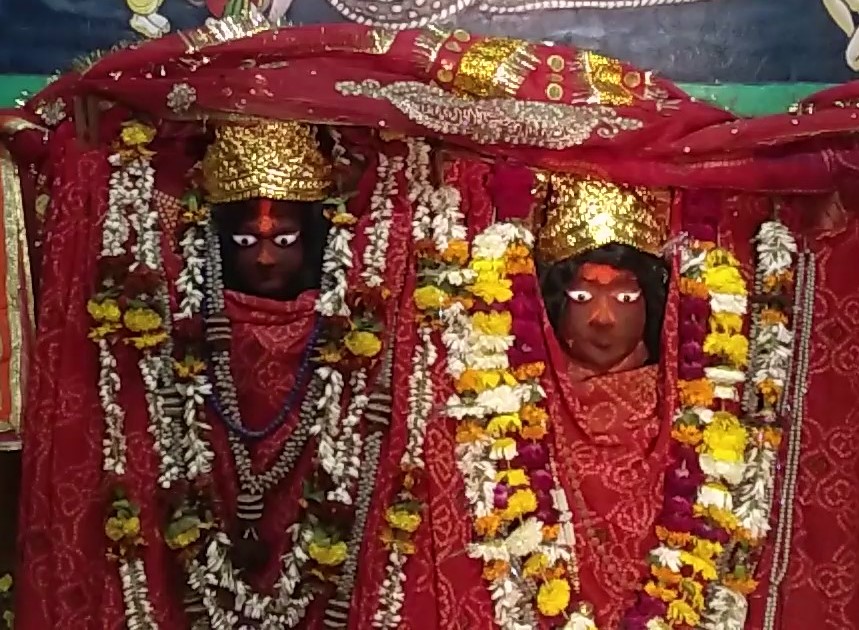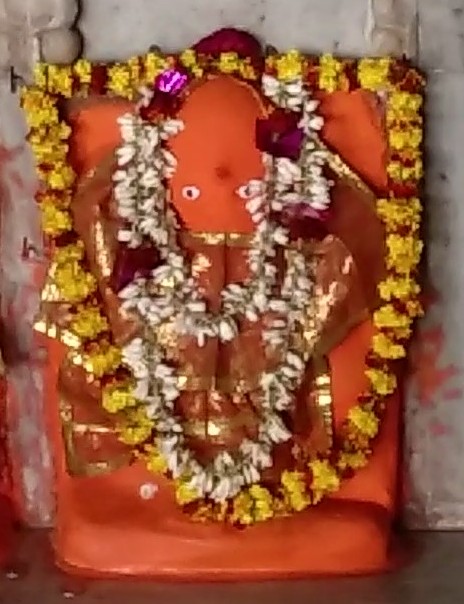SHRINGAR GAURI
Kashi Khand, Chapter 100 has prescribed Gauri Yatra (religious tour of Gauri temples). This Yatra is to be undertaken on Triteeya after Amavasya (3rd day after Amavasya).
After worshipping Sowbhagya Gauri, devotees have been advised to worship Shringar Gauri. Devotees who worship Shringar Gauri will get all sorts of happiness and prosperity in life.
(SHRINGAR GAURI)
Please watch our YouTube Video about Shringar Gauri at following Link
https://www.youtube.com/watch?v=65mhbPpO8XY&t=14s
LOCATION OF SHRINGAR GAURI
This Gauri is located behind Gyanvapi Masjid (mosque) and Darshan is allowed only on two days in an year. However, devotees worship this deity in Vishwanath (Visweshwar) temple premises marked as Annapurna Devi. Kindly refer Visveshwar temple regarding directions to reach the place. Devotees also worship one deity near Bansphatak flower market, near Satyanarayan temple as Shringar Gauri.
Devotees worship this deity on the fourth day of Chaitra Navaratri in March-April.
SHAILPUTRI
According to Kashi Khand, Chapter 70, in the vicinity of Shaileshwar, devotees should worship Shaileshwari also known as Shailputri.
Shailputri, with the little finger in her right hand, removes all the problems/obstacles faced by the devotees on account of bad company. One point needs to be mentioned. People enter into friendship or companionship with others without knowing others’ motives or inner feelings. At times the company may be bad and some problems may arise.
Maa Durga in her first form is known as Shailputri. As she was the daughter of the King of mountains Himalaya she had got this name. Her vehicle is bull, she has a trishul (trident) in her right hand and lotus flower in her left hand. Among the nine Durgas, who are worshipped during Navratri, she is the first Durga.
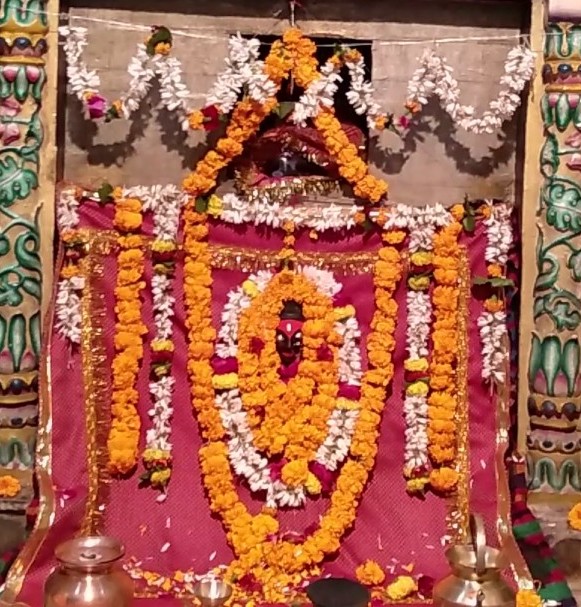
(SHAIL PUTRI DEVI)
In her earlier birth, she was the daughter of King Daksha and her name was Sati. Sati Devi got married to Lord Shiva. Sati in her rebirth was born as Shailraj Himalaya’s daughter and was known as Shailputri. She is also known as Parvati and Hemvati.
Shailputri also got married to Lord Shankar and as in her previous birth she become his other half. Shailputri’s importance and strength is unlimited.
Please watch our YouTube Video about Shailputri Devi at following Link
https://www.youtube.com/watch?v=4J2GrPNCmlc&t=32s
LOCATION OF SHAILPUTRI
Shailputri is located at A-40/11, Marhia Ghat. If one travels from Varanasi Railway station through G.T. Road, just before Varanasi City Station, a small road takes a left turn where he will encounter a level crossing. After crossing the road, he will have to travel for about 2 Kms. to reach this place. People can travel upto this place by rickshaw/auto rickshaw and most of the drivers know the place where Shailputri temple is located.
Shailputri Devi is worshipped on the 1st day of Navratri falling in September-October.
TYPES OF POOJA
The temple is open from 5.00 a.m. to 12.00 noon and from 03.00 p.m. to 10.00 p.m. Aarties are performed in the morning and in the evening. The timings may vary a little.
SANKATA DEVI
Kashi Khand has prescribed Durga Devi Yatra during Navratri where devotees have been exhorted to worship Durga Devi on all the nine days of Navratri.
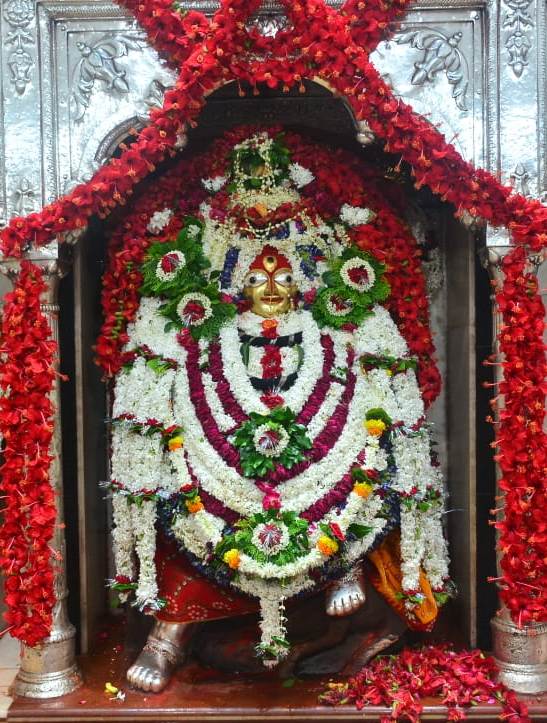
(SANKATA DEVI)
Devotees worship Sankata Devi on the 8th day of Navratri falling in September-October.
LOCATION OF SANKATA DEVI
Sankata Devi is located at Ck.7/159, Sankataji. Devotees can travel upto Chowk by rickshaw and travel on foot to this temple by asking for directions.
Sankata Devi temple falls in the vicinity of two Powerful Shakti Peeths, Panch Mudra Peeth (Atma Veereshwar temple) and Siddh Peeth (Siddheshwari Temple). Sankata Devi is a powerful form of Goddess and devotees who worship are showered with eternal happiness and prosperity.
There is a regular rush of votaries during all Fridays and on certain important days. The compiler was given to understand that special shringar or embellishment of the Devi are conducted in the temple as per the desire/request of the devotees. It means any devotee desiring to have special decoration may do so by contacting Poojaries well in advance.
Please watch our YouTube Video about Sankata Devi at following Link
https://www.youtube.com/watch?v=BQZWSYUQx5k&t=53s
TYPES OF POOJA
The place of worship remains open from 05.00 a.m. to 1.00 p.m. and from 04.00 p.m. to 10.00 p.m. Timings are flexible.
LOCATION BY GOOGLE MAP GIVEN BELOW
MUKHNIRMALIKA GAURI
Kashi Khand, Chapter 100 has prescribed Gauri Yatra (religious tour of Gauri temples). This Yatra is to be undertaken on Triteeya after Amavasya (3rd day after Amavasya).
Devotees are advised to take bath in Gopreksha Teerth and worship Mukhnirmalika Gauri.
Devotees who worship Mukhnirmalika Gauri will get all sorts of happiness and prosperity in life.
(MUKHNIRMALIKA GAURI)
LOCATION OF MUKHNIRMALIKA GAURI
Mukhnirmalika Gauri is located at K.3/42, Hanumanji temple at Gai Ghat. Devotees can travel upto Gaighat area behind Machhodari by rickshaw and walk to this place on foot, by asking for directions. Alternatively, they can take a boat ride upto Gai Ghat and climb the steps.
Devotees visit this temple on the first day of Chaitra Navaratri in March-April.
Please watch our YouTube Video about Mukhnirmalika Gauri at following Link
https://www.youtube.com/watch?v=fCdOgKOyD0s
TYPES OF POOJA
The temple is open for worship from 05.00 a.m. to 08.00 a.m. and from 05.00 p.m. to 08.00 p.m. Aarties are held in the morning and evening.
According to the devotees in the temple, people whose marriages are getting delayed on account of Mangal Graha (planet Mars), perform special pooja at this temple.
MANI KARNIKA DEVI
Lord Vishnu was describing to Sage Bindu, the various forms of Lord Vishnu and other deities in Kashi.
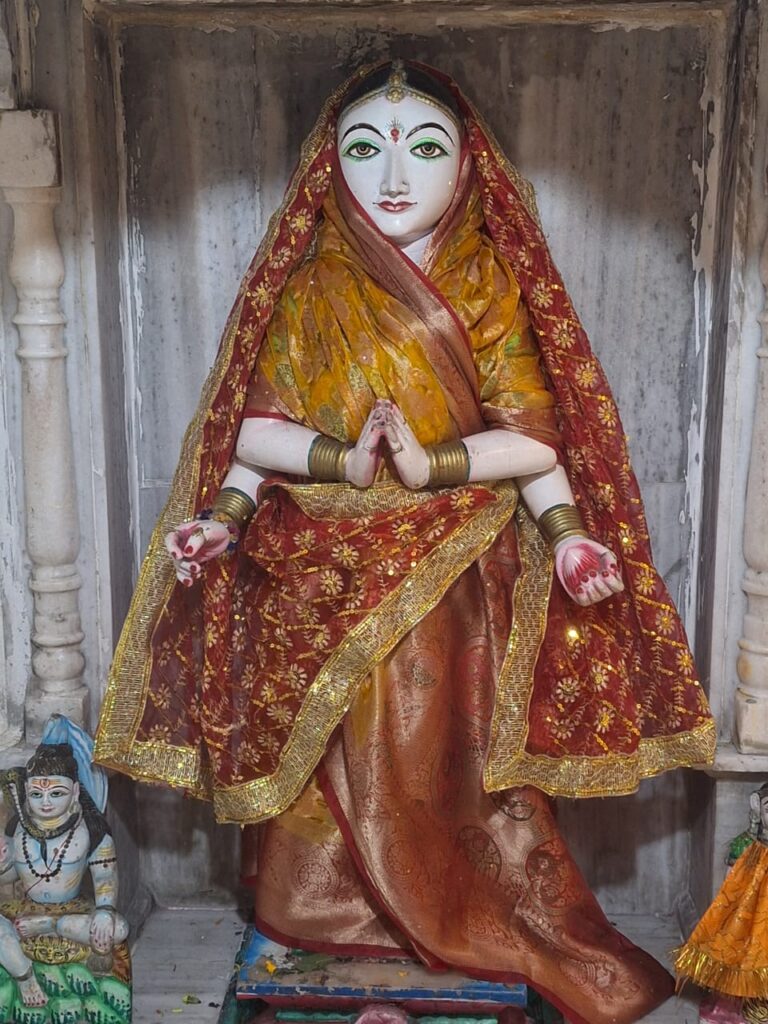
(MANIKARNIKA DEVI)
Lord Vishnu describes Manikarnika in the form of a Goddess near Chakra Pushkarini Teerth (Mani Karnika Ghat). Kashi Khand has described amply the structure and appearance of Manikarnika Devi who appears as a twelve year old girl. She is as fair as a Spatik (crystal), with soft hairs. The devi is described as radiating beauty.
Devotees who wish for attaining Moksha should worship this deity.
LOCATION OF MANIKARNIKA DEVI
Manikarnika Devi is located at Ck.7/130, Scindia Ghat, opposite Atma Veereshwar Temple. This place can be reached by boat through Scindia Ghat. Alternatively one can travel in cycle rickshaw upto Chowk and walk down the gullies to reach the temple. Atma Veereshwar is a famous temple.
TYPES OF POOJAS
The temple is open for worship 06.00 a.m. to 11.30 a.m. and from 04.30 p.m. to 9.30 p.m. Timings are flexible.
MANGALA GAURI
Once Lord Surya installed a Shiv Ling and a devi idol at Panchanada Teerth (Panchganga Ghat) and started immensely praying to Lord Shiva. (Importance of Panchganga Ghat is described under River Ganga-Teerths category).
The intensity of Lord Surya’s prayers started reflecting in the extreme heat generated thereby. Sunrays started getting warmer and warmer. Finally it became unbearable for all living beings and all physical activities practically came to a standstill.
Lord Shiva and Goddess Parvaty came to know about this and they appeared in person in front of Lord Surya. Lord Surya opened his eyes and started singing praises of Goddess Parvaty and Lord Shiva whereupon both of them became extremely happy. They granted several divine wishes to Lord Surya.
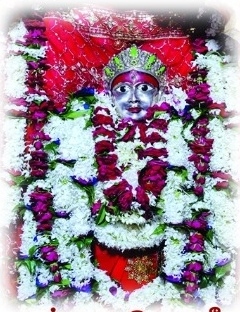
(MANGALA GAURI)
Lord Shiva told Lord Surya that the devi idol installed by the latter would be known as Mangala Gauri. A person who worships Mangala Gauri with all devotion is blessed with all happiness and prosperity. Unmarried girls will soon find a suitable match for themselves and childless couples will be blessed with children.
Special importance is laid by Kashi Khand, Chapter 49 for Chaitra Month (March-April), Shukla Paksha Tritheeya (3rd Day after amavasya) for worshipping this Goddess.
——————————————————————————————————-
Kashi Khand, Chapter 97, Shlok 187
क्षितिप्रदक्षिणफला मङ्गलैका प्रदक्षिणा
Performing one circumambulation (pradakshinam/Parikrama) of Mangala Gouri Devi will yield punya of performing pradakshinam/Parikrama of the entire world.
———————————————————————————————————
LOCATION OF MANGALA GAURI
Mangala Gauri is located at K-24/34, Panchganga Ghat. Devotees can travel upto Bhaironath by auto or cycle rickshaw and walk upto this place. Mangala Gauri temple is a famous landmark. Alternatively, they can take a boat ride upto Panchganga Ghat and reach this temple through Ghats.
Please watch our YouTube Video about Mangala Gauri at following Link
https://www.youtube.com/watch?v=3vw_Rptu-BE&t=61s
TYPES OF POOJA
The temple is open from 05.00 a.m. to 01.00 p.m. and from 03.00 p.m. to 10 p.m. Aarties are performed in the evening. For doing any special pooja etc., it is advisable to contact the Poojari. There is usually a large crowd on Tuesdays and locals say that many unmarried girls have had their wishes fulfilled by praying at this temple. Mangala Gauri is one of the 9 Gauris which are worshipped in Navratri falling in March-April (9 days preceding Ram Navami).
MAHALAKSHMI GAURI
According to Kashi Khand, Chapter 70, Mahalakshmi is present near Lakshmi Kund.
Devotees should take bath in Lakshmi Kund and worship Mahalakshmi. Devotees have also been advised to perform the rituals for their forefathers and give alms to needy people, whereby they will be blessed by Mahalakshmi.
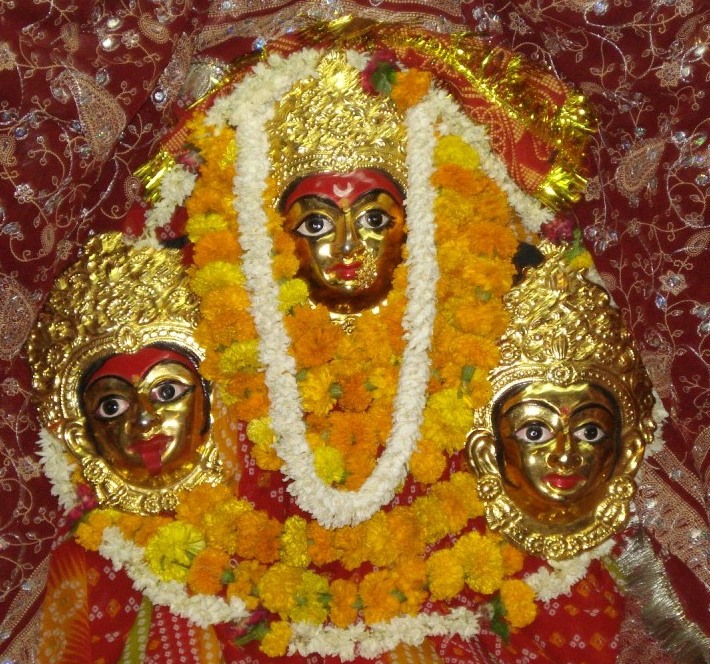
(MAHALAKSHMI GAURI)
Kashi Khand states that the entire locality is a Shakti Peeth (seat of vital energy). There are many powerful Devis in the area and of all the Shakti Peeths in Kashi, Mahalakshmi Shakti Peeth is the most powerful.
——————————————————————————————————-
Kashi Khand, Chapter 70, Shlok 60
सन्ति पीठान्यनेकानि काश्यां सिद्धिकराण्यपि
महालक्ष्मीपीठसमं नान्यल्लक्ष्मीकरं परम्
Although there are many Peethas in Kashipuri that give accomplishment (attainment), but there is no one else who is capable of giving ultimate prosperity like Mahalakshmi-peet.
———————————————————————————————————
Devotees who worship Mahalakshmi regularly will attain all kinds of Siddhi (divine powers) and achievements. Mahalakshmi will always reside in their homes. (Here Mahalakshmi is symbolic of wealth and prosperity).
Further, in Chapter 100, Kashi Khand has prescribed Nau Gauri Yatra (religious pilgrimage of nine Gauris) and Mahalakshmi is the ninth Gauri.
LOCATION OF MAHALAKSHMI GAURI
Mahalakshmi is located at D.52/40, Lakshmi Kund. This temple and the locality (Lakshmi Kund) are quite famous and people can approach this place through Luxa by rickshaw.
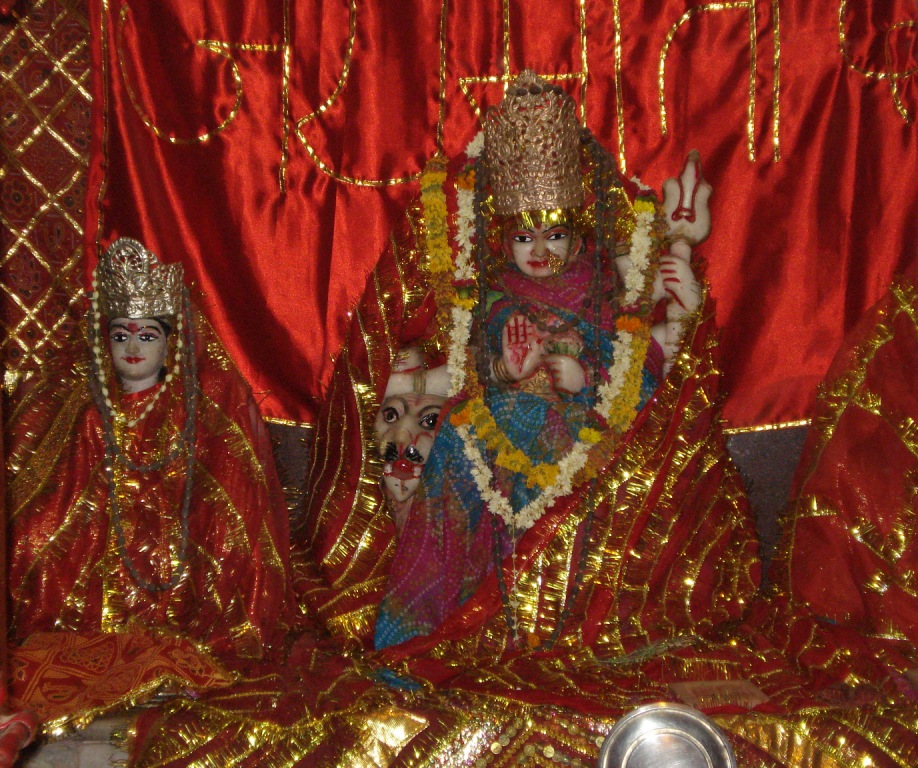
(SHIKHI CHANDI)
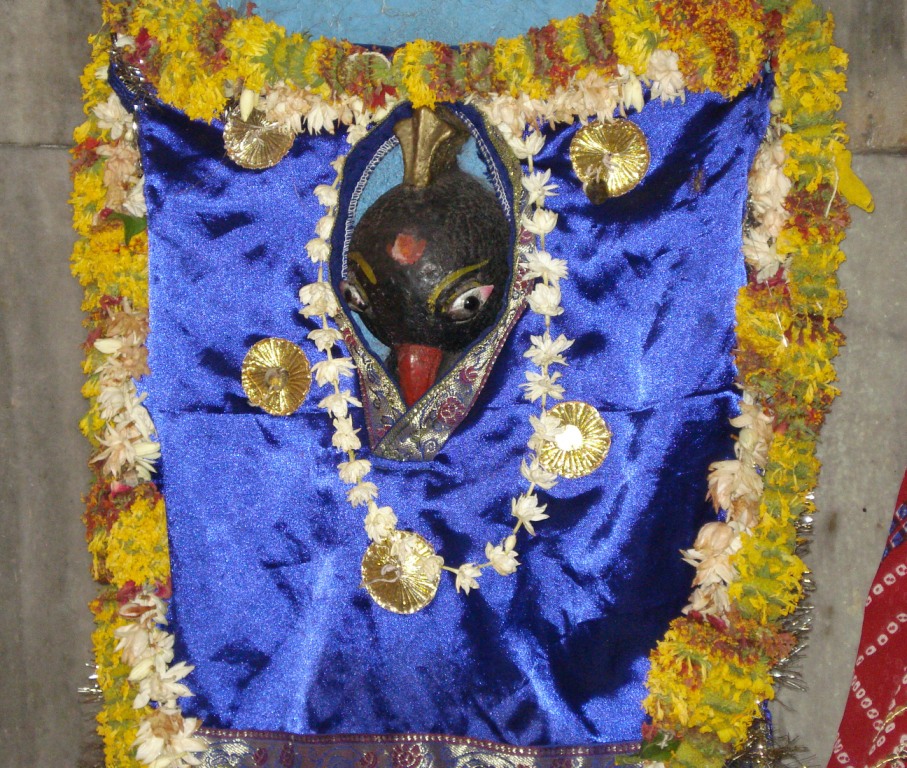
(MAYURI DEVI)
Further Shikhi Chandi Devi (Kashi Khand, Chapter 70), in the back side of the premises and Mayuri (Chapter 45) on the entrance to the right side are two other Devis which have been mentioned and are present in Mahalakshmi temple. Devotees may worship these Devis also as they are very powerful.
The temple also houses Ugreshwar Ling which finds mention in Kashi Khand.
There is heavy rush during Fridays and on Navratri days (March-April). While devotees throng this temple on Chaitra Navratri (March-April) on the 9th day, there is generally a huge crowd on practically all days of both Navratris.
Please watch our YouTube Video about Mahalakshmi Gauri at following Link
https://www.youtube.com/watch?v=3vw_Rptu-BE&t=61s
TYPES OF POOJA
The temple is open from 06.00 a.m. to 01.00 p.m. and from 05.00 p.m. to 10.00 p.m. Aarties are performed in the morning and evening.
LALITA GAURI
Near Ganga Keshav, there is a Teerth known as Lalita Teerth where Devi is present in the form of Lalita Gauri.
A person who worships Lalita Gauri with all sincerity is sure to get all wealth and prosperity. Aswin Month, (Sept. Oct.) Krishna Paksha, Dwiteeya, 2nd day after Poornima is considered auspicious for performing special pooja of Lalita Gauri.
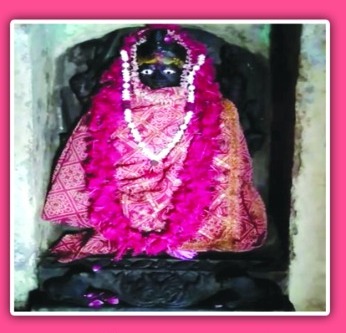
(LALITA GAURI)
A person who takes bath in Lalita Teerth (now Lalita Ghat) and worships Lalita Gauri is sure to be blessed with prosperity. (Kashi Khand, Chapter 70).
LOCATION OF LALITA GAURI
Lalita Gauri is present at Ck.1/67, Lalita Ghat. If one desires to walk on foot, he will have to travel upto Dasaswamedh by rickshaw and walk through the Ghats upto Lalita Ghat and climb the steps. If the devotee is already in the Gullies in the vicinity, Nepali Pasupati Mandir is an important landmark. However, Nepali Pasupati Mandir is not mentioned in Kashi Khand, as such the same is not covered here.
Lalita Gauri is one of the 9 Gauris which are worshipped in Navratri falling in March-April (9 days preceding Ram Navami).
Please watch our YouTube Video about Lalita Gauri at following Link
https://www.youtube.com/watch?v=65mhbPpO8XY&t=14s
TYPES OF POOJA
The temple also houses Kashi Devi and Bhagirath Devi idols. The temple is open from 05.00 a.m. to 09.00 a.m. and from 05.00 p.m. to 09.30 p.m. The timings may vary. It is advisable to combine visit to this temple alongwith other temples also.
KATYAYANI
According to Kashi Khand, Chapater 82, Once a kingdom was ruled by a very religious minded ruler named Amitrajit. He was a staunch devotee of Lord Vishnu and he made it a rule that all the citizens of his kingdom also become devotees of Lord Vishnu. One day Narad Rishi visited his palace and was welcomed with due respect by the King.
As per the direction of Narad Rishi, King Amitrajit saved one beautiful girl called Malayagandini from the clutches of one evil person. The King subsequently married her and they came to Kashi and were immediately happy with the beautiful surroundings. In due course, Malayagandini was blessed with a handsome male child, who was destined to become 16 years old, immediately after birth. However, since he was born in an inauspicious planetary combination, the Ministers of the King told the Queen that she had to sacrifice the child, otherwise the King would die.
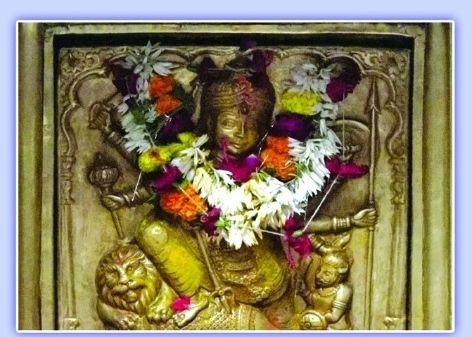
(KATYAYANI DEVI)
In order to save the King, she sent the child to Vikata Devi in Pancha Mudra Maha Peeth. Vikata Devi summoned various Yoginis and asked them to take the boy to Matrika Devis with whose permission, the child should be spared. Accordingly, the Yoginis took the boy to Matrika Devis, who after observing the divinity in the boy, ordered the Yoginis to take the boy back to Pancha Mudra Peet.
The boy was brought back to the Pancha Mudra peeth by the Yoginis where he started praying. In nut shell, the boy had undertaken a short trip to heaven and returned.
Vikata Devi is known and worshipped as Katyayini Devi.
Maa Durga’s 6th form is Katyayini. She got this name on account of the following story.
When Demon Mahishasur’s cruelty became unbearable on earth, Lords Brahma, Vishnu
and Shiva gave a part of their energies and created a Devi to kill Mahishasur. Sage Katyayan was the first person to perform her puja and so she is called Katyayini.
Maa Katyayini grants wishes to her devotees without fail. To acquire Krishna as their husband, the Gopis of Braj had performed her puja on the banks of Kalindi Yamuna. She is regarded as the supreme saviour Goddess in Braj (Mathura-Vrindavan).
Her form is supposed to be very simple and divine. Her colour is golden and radiant. She has four hands. Her upper right hand has the posture assuring safety or protection and lower right hand grants wishes. She has a sword in her upper left hand and a lotus flower in lower left hand. Her vehicle is lion.
Katyayini Devi blesses her devotees who are freed from any sort of disease, sorrow, fear and suffering. They radiate a supernatural energy.
Please watch our YouTube Video about Katyayani Devi at following Link
https://www.youtube.com/watch?v=7i5RVjROvbQ&t=68s
LOCATION OF KATYAYANI DEVI
Katyayini Devi is located in the premises of Atma Veereshwar Temple at Ck-7/158, Scindia Ghat which is a famous locality in Varanasi. One can reach this place by boat through Scindia Ghat. Alternatively one can travel in cycle rickshaw upto Chowk and walk down the gullies to reach the temple.
LOCATION OF ATMA VEERESHWAR TEMPLE AS PER GOOGLE MAPS IS GIVEN BELOW
The entire vicinity comes under the religious boundary of Pancha Mudra Maha Peeth. Any kind of pooja or archana is said to yield multiple results.
Katyayini is one of the Nine Durgas and devotees throng this temple on the 6th day of Navaratri falling in September-October.
TYPES OF POOJAS
The temple is open for worship 05.00 a.m. to 11.30 a.m. and from 12.30 p.m. to 9.30 p.m. Special Aarti is held from 07.00 to 8.30 p.m. For doing special pooja, it is advisable to consult the Poojari before hand.
KAMAKHYA DEVI (KAMAKSHI DEVI)
Lord Shiva was in Mandarachal and Kashi was ruled by a very pious and religious King named Divodas. In his Kingdom every one was very happy and there was all round prosperity. He had reached an understanding with Lord Brahma that as long as he was ruling, Devas and other celestial beings should stay away from Kashi and should not create any disturbance in Kashi. (Kashi Khand, Chapter 45).
Lord Brahma more or less agreed to it but on one condition that King Divodas should prove to be an excellent administrator and all people living in Kashi and visiting Kashi should be treated well in their religious pursuits. The King agreed and accordingly gave excellent governance.
Lord Shiva was very upset at being away from Kashi for a long time and he wanted to make King Divodas commit some mistake. Accordingly, he sent sixty four Yoginis to create some disturbance, but they were enthralled by the beauty and serene surroundings of Kashi which appeared to be a part of heaven. They ultimately settled down in Kashi and established themselves at various places all round the Kshetra. KAMAKHYA DEVI (KAMAKSHI DEVI) was one of them.
All the places where these Yoginis stationed themselves are regarded as Shakti Peeth. A person praying at these places will get divine energy. The devotees will be blessed with mental peace, victory in competitions and debates and will attain all round success.
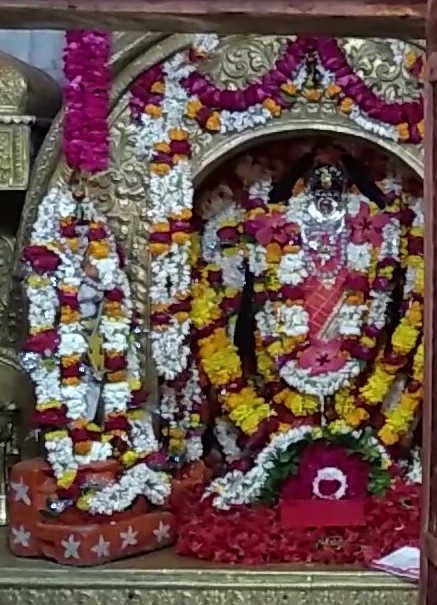
(KAMAKHYA DEVI)
Kashi Khand, Chapter 72, in another reference has described Kamakhya as a super power created by Goddess in her fight with Durgasur.
LOCATION OF KAMAKHYA DEVI
Kamakhya Devi temple is located at B.21/123, Kamachha. This is a famous temple and another temple “Batuk Bhairav temple” nearby is a famous landmark. In fact, the name of the locality Kamachha has been derived from the name of Kamakhya Devi. If a devotee travels from Bhelupura towards Rathyatra he will have to take a left turn just before multi storeyed Kashi Raaj Apartments to reach this place. Since the temple is quite famous, most of the rickshaw pullers know this place.
Please watch our YouTube Video about Kamakhya Devi at following Link
https://www.youtube.com/watch?v=BQZWSYUQx5k&t=53s
TYPES OF POOJA
The temple is open from 03.00 a.m to 12.00 p.m. and from 04.00 p.m. to 10.00 p.m. Aarties are held at 05.30 a.m. and 07.30 a.m. There is a heavy rush on Tuesdays, Fridays and during Navratri days (both in March-April and September-October).
POOJARIES OF THE TEMPLE
Shri Digambar Vireshwar Puri is the poojari of the temple.
